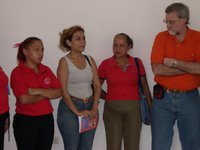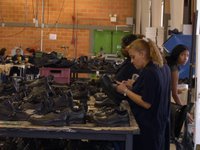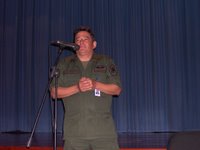

January 14, 2006
Thanks for sticking with us. We’ll file two reports today: one with pictures and commentary from Friday, January 13, and another with a few pictures and fewer words from our visit outside Caracas to a place called Barlovento on Saturday, January 14.
***
Caracas, regularly choked with traffic, seemed particularly close to a standstill on Friday nearest the city’s core. Venezuelans had their ears cocked to the closest television, radio, or street speaker, listening to their president, Hugo Chavez, deliver a five-hour plus state of the union address. Heavily armed soldiers were out adding a layer of security; we saw a military band march into place; Chavistas with their trademark red t-shirts listened and conversed on the street; vendors hawked Chavez t-shirts and Bolivariana baseball caps. A banner, “Chavez: Protector de Venezuela,” fluttered over the scene.
Before the speech started, our delegation was welcomed by Teodoro Petkoff, editor of the opposition newspaper Tal Cual. Petkoff, (pictured above) a Venezuelan patriot, fought in Venezuela’s civil war in the 1960s, was jailed and slipped away from jail twice in that decade. He is a former planning minister under the administration of President Caldera. He says that he is out of politics, though some believe he may consider a run for the presidency in 2006.
Petkoff is an opponent of the policies of President Chavez but is also tough-minded: he was an outspoken critic of the coup and general strike which took place in 2002.
In our conversation with him, he spoke with strength and specificity about the key issues he saw facing his country: actions taken by President Chavez to consolidate power and authority, including merging military and civilian powers in the office of the president; the rise in poverty over the last seven years in Venezuela (disputed by other observers in Caracas), despite Chavez’s emphasis on social missions; the political dynamics at work in Venezuela today including real political support for President Chavez and the debilitated condition of political parties; and the real shortcomings of U.S. policy not only toward Venezuela but also the entire region of Latin America.
Petkoff on the absence of checks and balances: From a practical point of view, there are no checks on this government: Supreme Court, Assembly, Attorney-General, Electoral Council, all are in the grip of Hugo Chavez. Now we have a parliament – not because of Chavez but because of the opposition’s decision not to participate in the last election – we have a parliament that is 100% Chavista.
Petkoff on the well-spring of support for Chavez: On the other side – on the social side – we must recognize that the greatest accomplishment of Hugo Chavez is that he has made the “social issue” the number one issue in Venezuela. For twenty years, the Social Democrats, the old political parties, did not deal with the impoverishment of the country. During the twenty years before Chavez, this country went from 20% poverty to 60% poverty. It is brutal. During this time, the old traditional parties transformed the electoral machines thinking only of themselves, fighting only for power, and nevermore spoke about the problems of the country. The country disappeared from the horizons of the political parties.
A taxi driver told me months ago, “I am not Chavista, but I will vote for him. I don’t want him to leave office; because if he does, you (the opposition parties) will forget about me again.” They know they are on his mind and in his checkbook.
Petkoff on what U.S. policy fails to understand: Chavez is helping (newly elected Bolivian president) Evo Morales. But to accuse (Morales) of dancing at the end of Chavez’s string is to show that you know nothing about Latin America. Evo Morales is the symbol of the inclusion movement. 60% of the population of Bolivia (the indigenous people) for the first time in 500 years now has a government. Who is Evo Morales? He is an expression of that. The indigenous people now have a chance at a better life.
If I were president of Venezuela, I would help Evo Morales. What’s the problem? …How can Bush attack Chavez for helping Evo Morales when Bush is giving money to everyone in Venezuela who is against Chavez?
I would say to Americans: Try to understand our history. Try to understand our grievances. [The problem with US policy is] the way you relate to Latin America. If every time a popular leader or an elected populist appears in the Latin American scene, it is reflexive on the part of American leaders to say “that is an enemy, or a potential enemy.” If, on the other hand, you try and understand the roots, the problems of the political parties, if you see Chavez as an answer, that Venezuelans looked for this way out, it is because of the failure of the prior government. If the political establishment of the U.S. does not understand why someone like Morales emerges than there is no future for U.S. policy in the region.
***
Just blocks from where the State of the Union was being delivered, two members of the Presidential Staff, Max Arvelaiz and Alex Main, foreign policy advisors to Hugo Chavez, broke away from the speech and met with the delegation.
They said that the state of the union address is an important speech for Chavez, because it gives a framework for their activities in 2006. It is the start of a presidential election year. They have plans for extensive travel by Chavez throughout Latin America. They have on-going plans for the social missions launched by Chavez. They have also the on-going challenges of US policy toward Venezuela and the region.
On the current state of US relations: Relations with the United States – at the highest level, there is no relationship at all. But that said it is in both nations’ interests to have some relationship at different levels. Following the coup in 2002, they came to recognize that the policy of the US government was to destabilize their government. There was deterioration in the relationship after that. They expressed their hope that after the November Congressional elections, or when there is a new administration, we hope there will be better relations.
US efforts to isolate Venezuela have failed: The aides said that Venezuela started 2005 feeling isolated, but it turned out to be a successful year. Venezuela joined Mercosur, the trade pact of the south. Venezuela intensified its initiatives to help countries in Latin America and the Caribbean weather the escalating price of oil, by providing petroleum under cut-rate financing agreements. The visions of the two countries clashed at the Summit of the Americas held in Argentina at Mar del Plata, when Venezuela fought the US vision for the region on trade. US candidates for the leadership of the OAS were blocked; unprecedented in the history of the organization. They said Venezuela no longer feels isolated, and asserted that the US is now on the defensive in the region.
The aides discussed wide-ranging issues – including police reform, the need for Venezuela to diversify its economy, and efforts it is making toward regional integration. We spoke of the need to restart the dialogue between the U.S. and Venezuela; if the Bush administration won’t talk to the Chavez government, we will look for ways to bring the conversation to Caracas.
***
For fifty years – fifty years! – Omar Calzadilla has been a teacher and an activist against illiteracy in Venezuela. He now runs the campaign for literacy in his country as Vice Minister in the Ministry of Education and Sports, in charge of the Robinson (literacy) mission. Just before six pm on Friday evening, as his colleagues were leaving the building to start the weekend, he spent time with the delegation to discuss his campaign to teach Venezuelan children and adults to read.
When the program began, Venezuela, a nation of 25 million people, had a crisis in literacy. Previous campaigns had failed. The immediate purpose of the new policy was to attack illiteracy. The question was whether it would be fast or slow. They wanted to attack it in a massive way. To accomplish this, they had to create an alternative education system.
The Venezuelan literacy campaign was based on efforts in Cuba that erased illiteracy in that country. They used printed (“Yo, Si puedo”) and multi-media resources created in Cuba. Venezuela purchased televisions, VCRs, and instructional manuals for the creation of centers where reading could be taught outside the formal school system. The target audience for the program is Venezuelans who live in extreme poverty and had been excluded from the education system.
The nation embarked on a social audit to find out where the illiterate members of its population could be found. They identified places where the literacy centers could be created and reach the people who needed the services. They had the military guard the equipment. They recruited teachers – and at the outset – the only requirement to be a teacher was the ability to read and write.
The initiative started official July 1, 2003. By October 28, 2005: 1,482,543 people had already been taught to read.
The social missions started at the primary school level. They have been expanded to include secondary school and college. The programs are aimed at each of these levels because the over-arching purpose is inclusion; it is a system that pays attention to those who had been excluded from education.
As the Venezuelans accumulated more experience with the program, they discovered related problems to illiteracy: students had no food, some had no glasses and they could not see, and many others had no money for transportation. So the policy has been expanded, budgets have been added to address these related issues.
The meeting concluded as members of the delegation expressed the hope that these programs would be permanent and sustainable in order to help more Venezuelans over time. The program clearly has a devoted warrior to make this campaign succeed.
***
The delegation continues its work today in Barlovento and later in Caracas. We’ll file another report soon. Until then, that’s Caracas Connect connecting from Venezuela.










